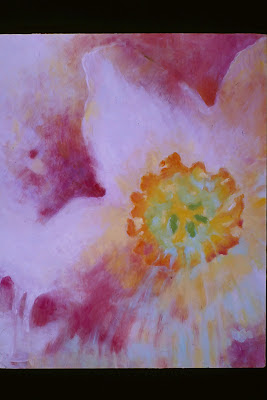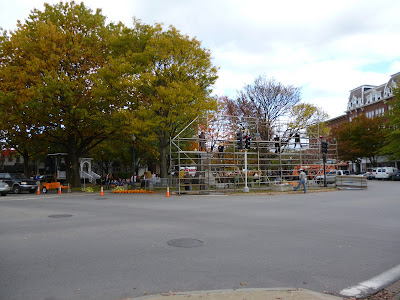This happens to be the exact time of year when I look up a favorite poem of mine entitled "Thaw" by the English poet, Edward Thomas (1878-1917). Since I cannot determine whether the poem is in the public domain, I will not write it out but will, at the bottom, post a link so that you can call it up. It is four lines only and lovely in its simplicity and ease in telling a little story that so well illustrates this particular seasonal moment. To paraphrase the poem: a thaw covers the countryside as the birds in the trees overhead can see what we on the ground do not yet see--the passing of winter. Stirring words for those of us who shut down in early November when the time and light change, only to revive when the time and light change again and we ease into spring finding ourselves stepping out without coat, mitts, boots. Opening an outside door for a moment of sweet fresh air. Catching the sun's new angle as it now floods the room.
Yes, winter is over. That doesn't mean we won't get more snow, but the chances are good it won't amount to much. In fact, I always leave my snow shovel out until April 15th. But in the meantime, the snow-pack will melt and crocuses will appear.
In looking up more about Edward Thomas, I found that he and Robert Frost were great friends, living for a time near each other during the Frosts' stay in England. They were such good friends, in fact, that Frost managed to persuade Thomas, a writer, to try writing poetry. Frost also put the idea in Thomas's bonnet to take his wife and children and go live in New England where they could be neighbors once again and encourage each other as poets, neither of whom was having all that much success just then.
Frost and Thomas also took frequent walks together with Thomas often trying to decide which path to take when they came to a fork, wanting to show his good friend something he thought was in one direction but that turned out not to be. It seems they even joked about it so that when Frost returned to New Hampshire, he sent his friend a copy of his new work, "The Road Not Taken," intending it to be light amusement.
But Thomas was at a grave cross-roads. The Great War had begun and though he was a family man and of an age when he need not go, he was trying to decide whether to enlist or not. (Or maybe move to New Hampshire.) He didn't really want to go to war, but he did want to meet full-on a depression and what he considered to be a lack of courage that had haunted him for some time. Reading Frost's poem turned out to be one more kick that contributed to his decision to enlist. He was killed in action after only two months in France. He was thirty-nine.
Edward Thomas is one of sixteen Great War poets listed on a memorial in Poet's Corner of Westminster Abbey.
Link to "Thaw"



























